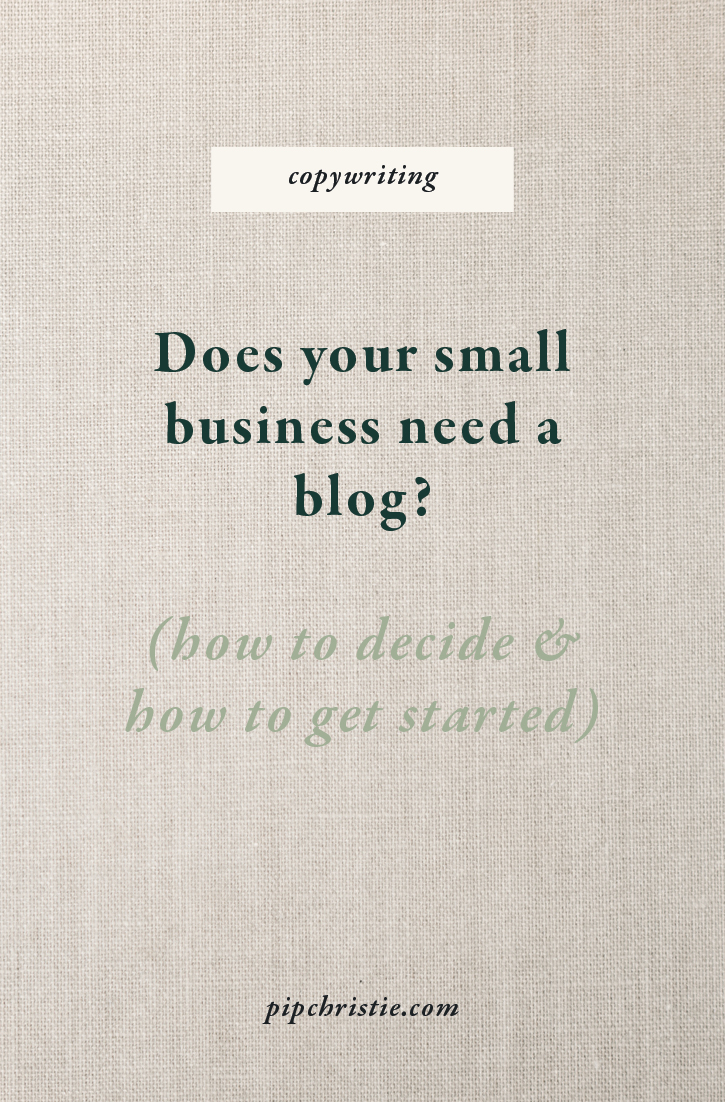Does my small business need a blog?
This week saw the Facebook family of apps – Instagram, Facebook and WhatsApp – go down for 14 hours, setting the digital world into a total spin as we were left in the dark as to what was happening with the platforms that so many of our businesses depend on. It got me thinking – there is no better time to start focussing on your ‘owned’ marketing activities than now. And yes, that includes blogging.
So, the short answer to “does my small business need a blog”? Absolutely!

What is a blog?
It might seem like a basic question but there are many different interpretations out there as to what blogging actually is. Often, blogging is seen as something primarily for influencers – a space to self-promote and earn revenue through affiliate marketing. Whilst this is definitely one way to approach blogging it certainly doesn’t encompass the endless ways that we can use blogs to grow our small businesses.
A blog is a space to deliver value from your small business that your customers and supporters won’t get elsewhere. It offers the chance to take a deeper dive than is possible in a simple social media caption. Instead, you are able to showcase your brand’s voice by acting as a helpful resource to your readership.
The power of content marketing
The beauty of blogging, as with all content marketing, is the ability to provide a valuable service to your customers and your readers that goes beyond the scope of your product or service.
Content marketing means that you are drawing your ideal customers directly to you in an authentic way simply because they are interested in and inspired by the content that you are publishing. This could mean free ebooks that detail how to solve a common problem that they’re likely to be facing, it could be a downloadable checklist that makes their day to day that little bit easier or it could mean a series of blog posts that inspire them with practical tips and a new routine.
The blog’s purpose in your business
You might be wondering, if I’m putting all this content out for free – why would anyone invest any money in my business to buy my products? This is a common fear to have but one you needn’t worry about.
The content you share on your blog doesn’t need to solely cover the product or services that you sell. Put yourself in the shoes of your ideal customer and ask:
- What are their challenges?
- What are their interests?
- What sort of lifestyle are they likely to be living?
- What are their aims?
Getting to know your ideal customer will help you to build a more rounded view as to who they are and how you can help them. Use this information to gather content ideas that will support them in living a better and easier life.
Let’s say you run a small business that sells natural locally produced bath products. It’s perfectly natural for you to create content around the importance of self care and taking time out of your day to enjoy a long soak in your bath but you can provide a lot more value to your customers than just that. Perhaps you know that many of your customers want to eat more local seasonal products – you could write a blog post that cover ‘how to eat with the seasons’. Or maybe you’ve heard that a lot of your customers are battling with stress – you could create a blog post that explores ‘five tips to ease stress on a daily basis’.
Whatever your industry, exploring topics that go outside the traditional limitations of your product whilst still remaining true to the core interests and challenges of your ideal customer will keep your audience engaged and connected with your business, meaning that the next time they’re looking to buy you will be at the forefront of their minds.
What storytelling means to you
Ever business needs a story, one that you will continue to tell through all aspects of your marketing and your blog is no different.
Your story is what makes your brand uniquely you. For me, it’s the Unedited approach – that raw openness that weaves its way through all of my work. For you, it might be a more bold approach.
Working on your values and determining your business’s personality will help you create more of a character for your brand. This might be something that you work on with a business coach or more independently, with yourself or your team. However you determine your brand’s ‘character’, make sure that it is one you feel comfortable sharing on a daily basis.
Your brand’s ‘character’ or your brand’s story will be written into every piece of work that you do. It should be clear in the design of your website, in the tone of your email newsletters, in every caption you put out on social media and in every content piece you create for your blog.
It’s this story that makes your brand unique and memorable, so that the next time a potential customer comes across a piece of your content they’ll recognise it. The content will resonate with them and stick in their mind, for it is speaking directly to them.
As a small business, you are uniquely positioned to share your story with your audience in a personable way that truly connects with your customers. For the most part, people who buy from small businesses are doing so because they are looking for something that bigger brands aren’t able to deliver to them – they’re looking for the personal experience.
“People who buy from small businesses are doing so because they are looking for something that bigger brands aren’t able to deliver to them – they’re looking for the personal experience.”
More and more people are looking to shop local, invest in independent businesses and support smaller brands. They are looking for that community feel and you have the chance to build your own community around your small business’ brand.
Write your website copy like a pro copywriter (without the pro price tag)
Introducing... the about page roadmap.
You’ll get access to the same copywriting framework I use with my small business clients. So you can have an about page that feels 100% you.



